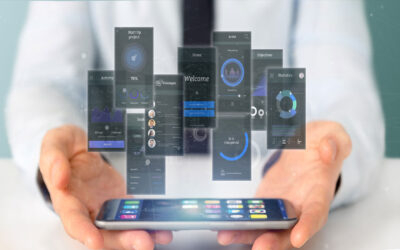Introduction
In today’s rapidly evolving digital landscape, businesses must stay ahead by leveraging innovative technologies that enhance user engagement. With the surge in mobile usage, the intersection of WordPress development and mobile app innovation is shaping the future of online experiences. WordPress, as a leading content management system (CMS), provides robust tools for website creation, while mobile apps offer personalized, on-the-go interactions.
This blog explores the convergence of WordPress and mobile app technology, examining their impact on engagement, monetization, community building, and emerging trends like Artificial Intelligence (AI), Progressive Web Apps (PWAs), and Augmented Reality (AR).
The Integration of WordPress and Mobile Apps
1. Advanced Analytics for Smarter Insights
Why Analytics Matter
Understanding user behavior is crucial for optimizing content and engagement strategies. By integrating Google Analytics, Firebase Analytics, or custom tracking solutions, businesses can:
- Gain insights into user preferences and interactions.
- Monitor engagement across web and mobile platforms.
- Optimize content and features based on real-time data.
How WordPress and Mobile Apps Use Analytics
- WordPress dashboards allow businesses to track web-based interactions.
- Mobile apps enable event-based tracking, capturing granular user actions.
- Combined insights help businesses refine marketing efforts and improve conversions.
Creating Seamless Omnichannel Experiences
2. Bridging Web and Mobile for Unified Branding
Consistency across digital touchpoints is key to fostering a seamless user experience. Businesses leveraging both WordPress websites and mobile apps can ensure:
- Uniform branding elements like color schemes, typography, and messaging.
- Smooth navigation between web and mobile platforms.
- Cross-device synchronization of user preferences and saved content.
3. Progressive Web Apps (PWAs) for a Hybrid Experience
Progressive Web Apps (PWAs) offer the best of both web and native mobile apps. With WordPress as the backend, businesses can:
- Enable offline access to content.
- Utilize push notifications to keep users engaged.
- Allow users to install web apps on mobile home screens.
4. Enhancing User Interactions with AI and Automation
Artificial Intelligence (AI) is transforming digital engagement by offering:
- AI-driven chatbots for 24/7 customer support.
- Personalized recommendations based on user behavior.
- Predictive analytics to anticipate user needs and tailor content.
AI in WordPress and Mobile Apps:
- WordPress plugins like ChatGPT AI Assistant enhance web experiences.
- Mobile apps integrate AI-driven personalization for better engagement.
Expanding Monetization Strategies
5. Moving Beyond Traditional Advertising
While ads remain a primary revenue source, businesses are shifting to diverse monetization models that offer:
- In-app purchases for digital products and premium features.
- Subscription-based models for exclusive content.
- Affiliate marketing and influencer collaborations to drive revenue.
6. Leveraging E-Commerce and Membership Models
- WordPress integrates with WooCommerce, offering a full-fledged e-commerce experience.
- Mobile apps improve shopping experiences through personalized push notifications.
- Membership models foster customer loyalty with VIP content and perks
Fostering Community Engagement
7. Strengthening User Communities Through Engagement
Community building fosters brand advocacy and long-term user retention. WordPress-powered mobile apps enable:
- User-generated content platforms (forums, blogs, review sections).
- Social media integration for seamless content sharing.
- Exclusive groups where members can interact and engage in discussions.
8. The Role of User-Generated Content (UGC)
Encouraging users to contribute content builds authenticity. Businesses can:
- Allow users to submit reviews, testimonials, and discussions.
- Enable photo and video uploads to create an engaging community.
- Provide incentives and gamification to encourage participation.
Emerging Technologies in Digital Engagement
9. Embracing Augmented Reality (AR) for Interactive Experiences
AR is reshaping engagement by offering:
- Virtual product try-ons for e-commerce.
- Interactive educational content.
- Enhanced event experiences with AR overlays.
WordPress themes and mobile apps can integrate AR to offer immersive, highly engaging experiences.
10. Voice-Activated Interfaces for Enhanced Accessibility
With the rise of voice search and AI assistants, businesses can optimize their platforms by:
- Implementing voice-enabled commands in mobile apps.
- Enhancing WordPress voice search capabilities for better accessibility.
- Offering smart assistant integrations for user convenience.
Building Long-Term Customer Relationships
11. Loyalty Programs for Increased Retention
Loyalty programs drive long-term engagement by offering:
- Exclusive rewards for app users.
- Personalized discounts based on user preferences.
- Referral bonuses to encourage customer advocacy.
Integrating loyalty programs into WordPress-powered mobile apps ensures repeat business and stronger brand loyalty.
Sustainable and Ethical Digital Strategies
12. Incorporating Sustainability and Social Responsibility
As businesses adopt more sustainable practices, digital engagement strategies must reflect these efforts. Companies can:
- Highlight eco-friendly initiatives on their WordPress sites and apps.
- Promote social responsibility through cause-driven marketing.
- Use digital platforms to educate and engage users on sustainability.
Conclusion
The future of digital engagement lies at the crossroads of WordPress development and mobile app innovation. Businesses that embrace this convergence will unlock new possibilities for:
- Data-driven decision-making through advanced analytics.
- Personalized user experiences powered by AI.
- Seamless omnichannel branding across web and mobile.
- Emerging technology adoption like AR, voice interfaces, and PWAs.
As consumer behaviors and technologies evolve, businesses must stay agile, innovative, and user-focused to maintain a competitive edge in the digital landscape.
Search
Categories
- AI 4
- Analytics & Data Science 16
- Blogs 8
- Brand Identity 23
- Business 11
- CMS & LMS 22
- Development 1
- Digital Marketing 20
- Digital Signage 13
- E-commerce 7
- Education & E-Learning 1
- Enterprise solution 16
- Events 2
- Food & Grocery 1
- Internet of Things 9
- Mobile App Development 15
- News 5
- Open Source Development 12
- SEO Search engine optimization 2
- Software 1
- Staff Augmentation 3
- Uncategorized 28
- Web Design 1
- Web Development 19
- Web Security and Performance 19
- Website Development 2
- WordPress Development 3
Recent Posts
-
Shopify Platform: Powering Scalable and Flexible E-Commerce Businesses
-
Anthropic AI Tool: A Safety-First Approach to Enterprise Artificial Intelligence
-
Analisi dei pro e contro nella scelta di un casino non ADM per il gioco d’azzardo
-
Les avantages de choisir un casino proposant des free spins attractifs pour les joueurs
-
Analyse approfondie des options de Jeu du poulet accessibles en ligne




